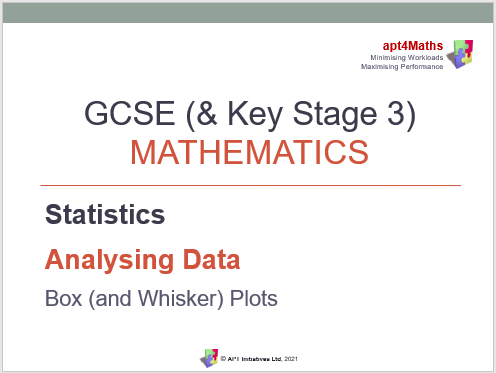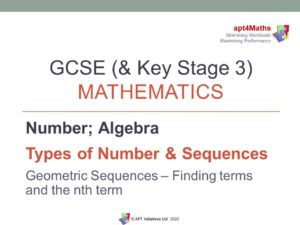apt4Maths: PowerPoint Presentation on Analysing Data – Box (and Whisker) Plots – for GCSE (and Key Stage 3) Mathematics
£0.00
(VAT will be calculated at checkout)
If you are a school/college and would like to place an order and be INVOICED later, please email sales@apt-initiatives.com.
This is the 7th PowerPoint Presentation only of the full set of 7 PowerPoint Presentations on Analysing Data for GCSE (and Key Stage 3) Maths. This PowerPoint explains how to produce and interpret a box (and whisper) plot, and explains about distribution shapes and skewness, and how to compare distributions. It also explains how to determine ‘outlier’ values for box plots using the IQR.
The full set of 7 PowerPoint Presentations on Analysing Data can be purchased from www.apt-initiatives.com
Product Information
This full set of 7 PowerPoint Presentations on Analysing Data (129 slides, excluding Title Pages) covers the following topics:
- 01 Averages – Mode (19 slides): Reviews and interprets different types of data representations (charts, tables and graphs) before explaining what a modal average is and how to find the mode for qualitative or discrete data. It also explains how to find the modal class for grouped or continuous data.
- 02 Averages – Median (19 slides): Reviews and interprets different types of data representations before explaining what a median average is, how to find the median for discrete data, and how to find the median class for grouped or continuous data. It also explains how to calculate an estimate of the median for continuous data.
- 03 Averages – Mean (19 slides): Reviews and interprets different types of data representations before explaining what a mean average is, how to find the mean for discrete data, and how to calculate an estimate of the mean for grouped or continuous data.
- 04 Measures of Dispersion – Range (16 slides): Reviews and interprets different types of data representations before explaining how to calculate the range for discrete data and how to calculate the maximum range for grouped or continuous data.
- 05 Measures of Dispersion – Interquartile Range (20 slides): Explains how to calculate the interquartile range for discrete data, and how to find the interquartile range from a cumulative frequency curve or polygon. It also explains how to estimate the interquartile range for continuous data.
- 06 Cumulative Frequency (25 slides): Explains how to produce and interpret a cumulative frequency table, how to draw and interpret cumulative frequency curves or polygons, and how to find quartiles, deciles and percentiles as well as the interpercentile range.
- 07 Box (and Whisker) Plots (11 slides): Explains how to produce and interpret a box (and whisper) plot, and explains about distribution shapes and skewness, and how to compare distributions. It also explains how to determine ‘outlier’ values for box plots using the IQR. INCLUDED in this download





